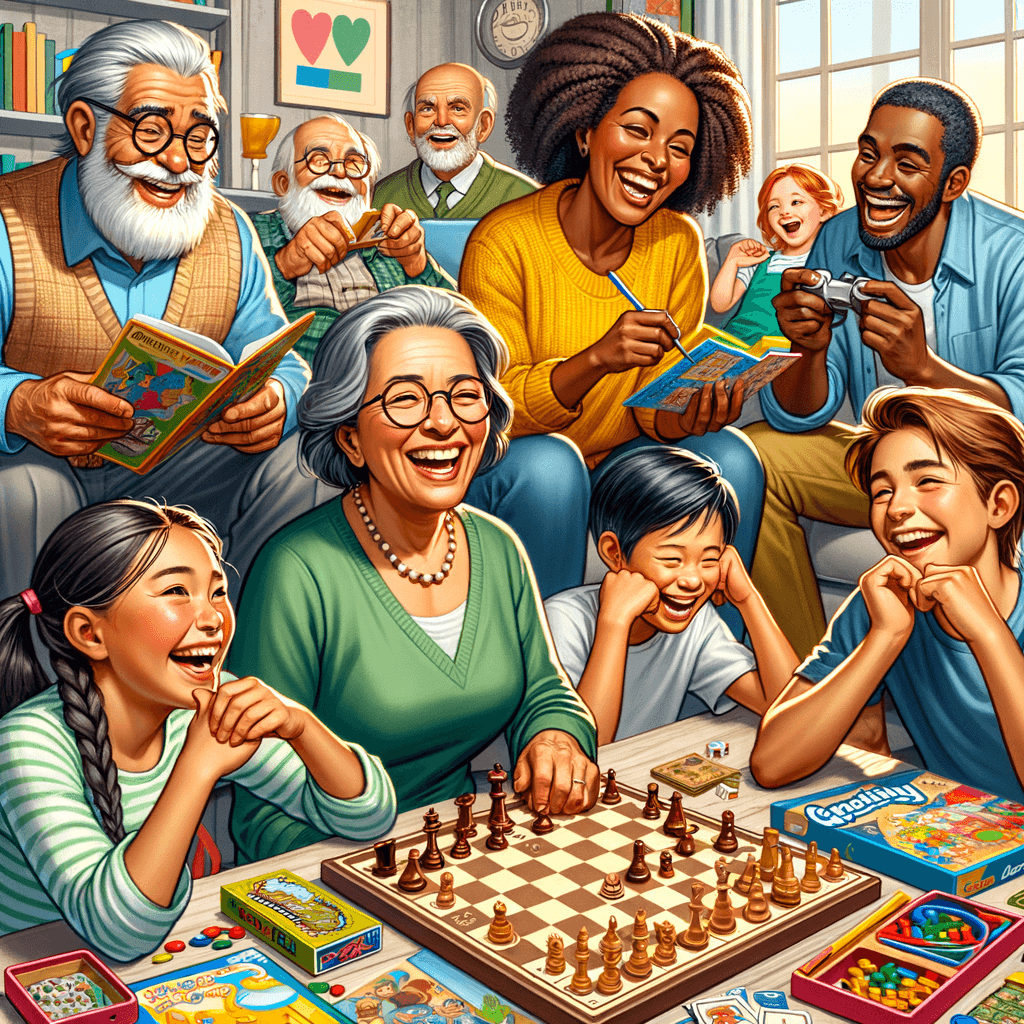Introduction to Board Games for Learning
Hey there, game lovers! Ever wondered how your favorite board games could be more than just a fun pastime? Well, you’re in for a treat! Board games are not only a great way to spend time with family and friends, but they can also be a powerful tool for learning. Let’s dive in and see how!
-
- The Importance of Learning Through Play
Learning through play is like sneaking vegetables into a delicious smoothie – you’re having so much fun, you don’t even realize you’re learning! According to Wikipedia, play-based learning can help improve memory and stimulate the brain. It’s a win-win situation – you’re having a blast and becoming smarter at the same time!
-
- The Benefits of Educational Board Games
Board games are like a secret weapon for learning. They can help us develop important skills like problem-solving, critical thinking, and teamwork. Plus, they’re a great way to learn new things without even realizing it. For instance, games like ‘Scrabble’ can improve your vocabulary, while ‘Monopoly’ can teach you about money management. Cool, right?
-
- How to Choose the Right Board Games for Your Family
Choosing the right board game for your family can be as easy as pie! Consider the age of the players, their interests, and the skills you’d like to develop. For younger kids, games with simple rules and colorful pieces can be a hit. For older kids and adults, strategy games can provide a fun challenge. Remember, the best game is the one that brings your family together and makes learning fun!
So, are you ready to turn game night into a learning adventure? Stay tuned as we explore different learning styles, board games for different ages, and how to make the most of your family game night. Let’s roll the dice and start the fun!

A Guide to Different Learning Styles
Hey there, game lovers! Let’s dive into the exciting world of learning styles. Today, we’re focusing on the visual learning style. What’s that, you ask? Let’s find out!
Visual Learning Style
Visual learning is a way of learning where you learn best by seeing things. It’s like when you look at a picture and understand what’s happening better than when someone just tells you about it. Now, let’s break it down a bit more.
-
- Definition and characteristics
Visual learners are people who prefer to use images, maps, and graphic organizers to understand information. They have a good sense of direction because they visualize maps and they have a clear picture of where things are. They often like to take notes or draw pictures to help remember information. They’re great at spotting patterns and they often have an excellent memory for details in images.
-
- Examples of board games for visual learners
Board games can be a fun way for visual learners to pick up new skills. Games like “Ticket to Ride” and “Settlers of Catan” have colorful boards and pieces that can help visual learners understand the game rules better. “Carcassonne” is another great game where players build a medieval landscape tile by tile, which can be a fun way for visual learners to engage with the game. Remember, the key for visual learners is to see the information in a way that makes sense to them. So, games with lots of visuals can be a big hit!
So, if you’re a visual learner, or you know someone who is, why not try out these games? They might just be the perfect fit for you. And remember, learning can be fun when you find the right style for you!
Auditory Learning Style
Hey there, let’s dive into the world of auditory learners. These are the folks who learn best by listening. They have a knack for remembering what they hear and can often recall information after hearing it just once. They’re the ones who can remember song lyrics after hearing a tune only a couple of times. Cool, right?
-
- Definition and Characteristics
Auditory learners, as the name suggests, are those who learn best through hearing. They prefer to listen to information rather than reading it or seeing it visually. They’re great at remembering details from conversations, lectures, and audio recordings. They might even find themselves reading out loud or talking things through to understand better. They’re also pretty good at picking up on changes in tone and pitch, which can help them understand the emotions and intentions behind what’s being said. Learn more about auditory learners here.
-
- Examples of Board Games for Auditory Learners
Now, let’s talk about some board games that are perfect for our auditory learner friends. These games are not only fun but also help to enhance their listening skills.
-
-
- “Simon Says” – This classic game is all about listening carefully and following audio instructions.
- “Zingo” – A fun and fast-paced game where players have to listen for the caller’s words and match them to their cards.
- “Bananagrams” – This word game encourages players to spell out words, helping auditory learners to hear and remember new vocabulary.
-
These games are not only entertaining but also a great way to enhance auditory learning skills. So why not give them a try?
Kinesthetic Learning Style
Hey there, game lovers! Ever heard of the term ‘Kinesthetic Learning Style’? Well, don’t worry if you haven’t. We’re here to break it down for you in a fun and easy way!
-
- Definition and characteristics
Kinesthetic learning, also known as tactile learning, is all about doing and moving. Kinesthetic learners learn best by touching, feeling, and experiencing things first-hand. They love to get their hands on things, literally! They find it easier to remember stuff when they’ve done it themselves rather than just reading or hearing about it. These learners are usually great at sports, dance, and other physical activities. They also tend to use gestures while explaining things and can’t sit still for long periods. Sounds like you or someone you know? Then you might be a kinesthetic learner!
-
- Examples of board games for kinesthetic learners
Now, let’s talk about some cool board games that are perfect for kinesthetic learners. These games involve a lot of movement and hands-on activities that will keep kinesthetic learners engaged and help them learn better.
-
- Jenga: This classic game is all about physical skill. Players take turns removing one block at a time from a tower and balancing it on top, creating a taller and increasingly unstable structure as the game progresses.
- Twister: Twister is a game of physical skill that will have players laughing as they get tangled up with each other. It’s a great way for kinesthetic learners to burn off some energy while also working on their coordination and balance.
- Operation: Operation requires a steady hand and careful concentration as players use tweezers to remove various “ailments” from the patient without setting off the buzzer.
So, there you have it! If you’re a kinesthetic learner, these games are perfect for you. Not only will they keep you engaged, but they’ll also help you learn and develop new skills. So, what are you waiting for? Let’s get playing!
Board Games for Different Ages
Board games are a fun way to spend time with family and friends. But did you know they’re also great for learning? Let’s explore some of the best board games for different ages, starting with kids.
Board Games for Kids
Playing board games is not just about having fun for kids. It’s also about learning new skills and improving their thinking abilities. Let’s dive in and see what benefits board games can bring to kids and which ones are the best for them.
-
- Benefits of Board Games for Kids
Board games are an excellent tool for kids’ development. They help improve their cognitive skills, like problem-solving and decision-making. They also enhance their social skills as they learn to cooperate and compete with others. Plus, board games can boost kids’ self-esteem when they win and teach them to handle loss gracefully.
-
- Top 5 Board Games for Kids
Choosing the right board game for your kid can be tricky. But don’t worry, we’ve got you covered. Here are the top 5 board games that kids absolutely love:
-
- Candy Land: A classic game that teaches color recognition and counting.
- Chutes and Ladders: This game is great for teaching kids about numbers and counting.
- Guess Who?: A fun game that improves memory and deduction skills.
- Connect 4: This game enhances strategic thinking and planning.
- Uno: A card game that helps kids learn about numbers, colors, and matching.
So, there you have it! Board games are not just about fun and games. They’re also about learning and growing. So why not grab a board game and start playing with your kid today?
Board Games for Teens
Hey there! If you’re a teenager or know one who loves to have fun, you’re in the right place. We’re going to talk about board games for teens. But these aren’t just any games – they’re games that can help you learn, grow, and have a blast at the same time. Let’s dive in!
- Benefits of Board Games for Teens
Board games aren’t just for kids, you know. They’re great for teenagers too! Here’s why:
- Learning Skills: Board games can help you learn and practice important skills like strategy, problem-solving, and decision-making. Think about it – when you’re playing a game, you’re constantly thinking about your next move and how to win.
- Social Interaction: In a world where we’re often glued to our screens, board games provide a great way to interact with others face-to-face. They can help you improve your communication skills and learn how to work as a team.
- Fun and Relaxation: Let’s not forget – board games are fun! They can help you relax and unwind, and they’re a great way to spend time with friends and family.
- Top 5 Board Games for Teens
Ready to get your game on? Here are the top 5 board games for teens:
| Game | Description |
|---|---|
| 1. Catan | A strategy game where you collect resources and build settlements. It’s all about planning and negotiation. |
| 2. Ticket to Ride | A railway-themed game where you build train routes across the country. It’s a race to see who can travel the most! |
| 3. Codenames | A word game where you try to find the secret identities of agents. It’s a test of your vocabulary and deduction skills. |
| 4. Pandemic | A cooperative game where you work together to stop a global outbreak. It’s all about teamwork and strategy. |
| 5. Clue | A classic detective game where you solve a murder mystery. It’s a test of your logic and deduction skills. |
So there you have it – the benefits of board games for teens and the top 5 games to try. Ready to roll the dice?
Board Games for Adults
Hey there, grown-ups! Who said board games are just for kids? Not us! Board games can be a blast for adults too. Let’s dive into why board games are great for adults and which ones you should try out.
- Benefits of board games for adults
Playing board games isn’t just fun, it’s also good for you. Here are a few reasons why:
- Brain Boost: Board games can help keep your mind sharp. They make you think, strategize, and problem-solve. It’s like a workout for your brain!
- Social Time: Board games are a great way to spend time with friends and family. They encourage conversation and laughter.
- Stress Relief: Having a bit of fun can help you unwind and relax. It’s a great way to take a break from the hustle and bustle of daily life.
- Top 5 board games for adults
Ready to get your game on? Here are our top 5 picks for board games that adults will love:GameDescription
So, there you have it! Board games aren’t just for kids. They’re for adults too. So why not grab a game, gather some friends, and have a blast?
Family Learning Activities with Board Games
Board games are more than just a way to have fun. They can also be a powerful tool for learning. Let’s dive into how you can incorporate board games into your family learning activities and hear from a family who has done just that.
-
- How to incorporate board games into family learning activities
Board games can be a great way to make learning fun. Here are some tips on how you can use them in your family learning activities:
-
-
- Choose the right game: Not all board games are created equal. Some are more educational than others. Look for games that challenge your kids’ thinking and problem-solving skills. Games like Scrabble can help improve vocabulary and spelling, while games like Monopoly can teach about money and business.
- Play regularly: Make board game night a regular event in your family. This will give your kids plenty of opportunities to learn and practice new skills.
- Discuss the game: After playing, talk about the game with your kids. Ask them what they learned and how they could use those skills in real life. This will help reinforce the learning.
- Case study: A family’s experience with educational board games
-
Meet the Johnson family. They’ve been using board games as a part of their homeschooling routine for the past two years. Here’s their story:
“We started using board games as a way to make learning more fun for our kids. We were amazed at how much they learned from playing. Our oldest improved her math skills by playing Monopoly, while our youngest learned about geography from playing Ticket to Ride. The best part is, they don’t even realize they’re learning because they’re having so much fun!”
The Johnson family’s experience shows that board games can be a valuable addition to any family’s learning activities. So why not give it a try? Your family might just discover a new favorite way to learn!
Board Games for Skill Development
Did you know that board games can do more than just entertain us? They can also help us develop important skills. Let’s take a closer look at how board games can boost our cognitive skills.
Cognitive Skills
Cognitive skills are the core skills your brain uses to think, read, learn, remember, reason, and pay attention. Playing board games can help enhance these skills.
-
- How board games enhance cognitive skills
Board games often require players to think strategically, make decisions, and remember details. This can help improve memory, concentration, and problem-solving skills. For example, in a game of chess, you need to remember the moves of your opponent and plan your own moves in advance. This can help enhance your memory and strategic thinking skills.
-
- Examples of board games for cognitive skill development
There are many board games that can help develop cognitive skills. Here are a few examples:
-
- Chess: This classic game helps improve strategic thinking and memory.
- Scrabble: This word game can enhance vocabulary and spelling skills.
- Clue: This mystery game can improve problem-solving skills and attention to detail.
So, the next time you play a board game, remember that you’re not just having fun. You’re also boosting your brain power!
Social Skills
Board games aren’t just about fun and games, they’re also a great way to enhance social skills. Let’s dive into how they do this and some examples of games that can help develop these skills.
-
- How board games enhance social skills
Playing board games is a social activity that requires interaction and communication. It’s not just about winning, it’s about working together, taking turns, and respecting others. These games teach kids how to be patient, how to handle winning and losing gracefully, and how to communicate effectively. They also encourage kids to step out of their comfort zones and interact with others, which can boost their confidence and self-esteem.
-
- Examples of board games for social skill development
There are many board games that can help enhance social skills. Here are a few examples:
-
- Uno: This classic card game requires players to pay attention to the game, follow rules, and interact with others in a fun and friendly way.
- Charades: This game encourages communication and teamwork as players work together to guess the word or phrase being acted out.
- Monopoly: This game teaches negotiation skills and strategic thinking. It also teaches players about the importance of fair play and respecting others’ turns.
So, the next time you’re thinking about a fun family activity, consider pulling out a board game. Not only will you have a great time, but you’ll also be helping your kids develop important social skills.
Conclusion: The Power of Educational Family Games
As we wrap up our journey through the exciting world of educational family games, it’s clear to see the powerful impact they can have. Not only do they provide a fun and engaging way for families to spend time together, but they also offer a wealth of learning opportunities for kids of all ages.
-
- Key takeaways
Throughout this article, we’ve explored the many ways in which board games can support learning. Here are the key points to remember:
-
-
- Board games can cater to different learning styles, making them a versatile educational tool.
- There are games suitable for all ages, meaning everyone in the family can get involved and learn something new.
- Playing board games as a family can help develop a range of skills, from critical thinking to communication.
- Final thoughts on the benefits of board games for learning
-
Board games are more than just a fun pastime. They’re a powerful educational tool that can help children learn and grow in a relaxed, enjoyable environment. By incorporating board games into your family time, you’re not just creating memories – you’re also supporting your child’s development and learning.
So, why not dust off that old board game in your closet or explore some of the many educational games available today? You’ll be surprised at just how much fun learning can be!



